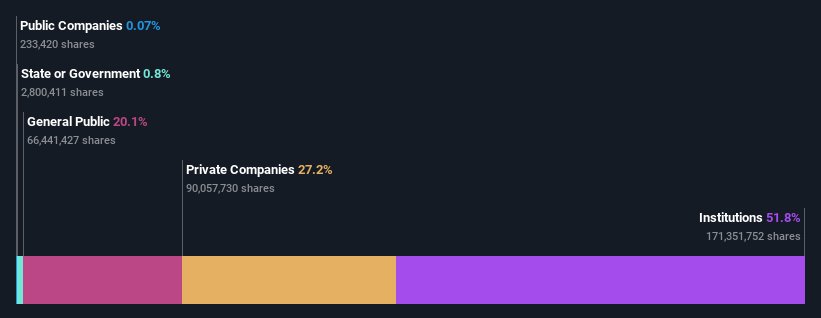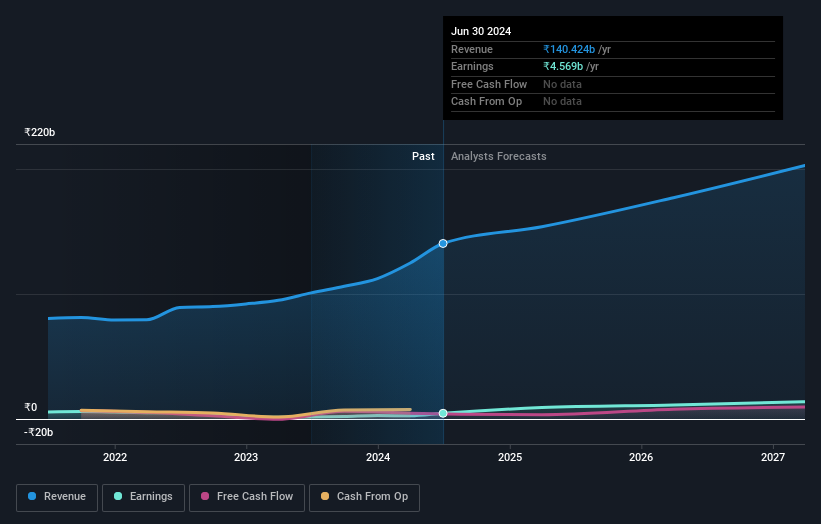- India
- /
- Construction
- /
- NSEI:VOLTAS
Institutional investors may overlook Voltas Limited's (NSE:VOLTAS) recent ₹23b market cap drop as long-term gains remain positive

Key Insights
- Significantly high institutional ownership implies Voltas' stock price is sensitive to their trading actions
- 51% of the business is held by the top 8 shareholders
- Using data from analyst forecasts alongside ownership research, one can better assess the future performance of a company
To get a sense of who is truly in control of Voltas Limited (NSE:VOLTAS), it is important to understand the ownership structure of the business. We can see that institutions own the lion's share in the company with 52% ownership. That is, the group stands to benefit the most if the stock rises (or lose the most if there is a downturn).
Institutional investors was the group most impacted after the company's market cap fell to ₹591b last week. However, the 108% one-year returns may have helped alleviate their overall losses. But they would probably be wary of future losses.
Let's take a closer look to see what the different types of shareholders can tell us about Voltas.
See our latest analysis for Voltas

What Does The Institutional Ownership Tell Us About Voltas?
Institutional investors commonly compare their own returns to the returns of a commonly followed index. So they generally do consider buying larger companies that are included in the relevant benchmark index.
Voltas already has institutions on the share registry. Indeed, they own a respectable stake in the company. This suggests some credibility amongst professional investors. But we can't rely on that fact alone since institutions make bad investments sometimes, just like everyone does. When multiple institutions own a stock, there's always a risk that they are in a 'crowded trade'. When such a trade goes wrong, multiple parties may compete to sell stock fast. This risk is higher in a company without a history of growth. You can see Voltas' historic earnings and revenue below, but keep in mind there's always more to the story.

Institutional investors own over 50% of the company, so together than can probably strongly influence board decisions. We note that hedge funds don't have a meaningful investment in Voltas. Tata Sons Private Limited is currently the company's largest shareholder with 27% of shares outstanding. For context, the second largest shareholder holds about 4.8% of the shares outstanding, followed by an ownership of 3.9% by the third-largest shareholder.
We did some more digging and found that 8 of the top shareholders account for roughly 51% of the register, implying that along with larger shareholders, there are a few smaller shareholders, thereby balancing out each others interests somewhat.
While it makes sense to study institutional ownership data for a company, it also makes sense to study analyst sentiments to know which way the wind is blowing. There are a reasonable number of analysts covering the stock, so it might be useful to find out their aggregate view on the future.
Insider Ownership Of Voltas
While the precise definition of an insider can be subjective, almost everyone considers board members to be insiders. Management ultimately answers to the board. However, it is not uncommon for managers to be executive board members, especially if they are a founder or the CEO.
I generally consider insider ownership to be a good thing. However, on some occasions it makes it more difficult for other shareholders to hold the board accountable for decisions.
We note our data does not show any board members holding shares, personally. It is unusual not to have at least some personal holdings by board members, so our data might be flawed. A good next step would be to check how much the CEO is paid.
General Public Ownership
With a 20% ownership, the general public, mostly comprising of individual investors, have some degree of sway over Voltas. This size of ownership, while considerable, may not be enough to change company policy if the decision is not in sync with other large shareholders.
Private Company Ownership
We can see that Private Companies own 27%, of the shares on issue. It might be worth looking deeper into this. If related parties, such as insiders, have an interest in one of these private companies, that should be disclosed in the annual report. Private companies may also have a strategic interest in the company.
Next Steps:
While it is well worth considering the different groups that own a company, there are other factors that are even more important. Be aware that Voltas is showing 2 warning signs in our investment analysis , you should know about...
But ultimately it is the future, not the past, that will determine how well the owners of this business will do. Therefore we think it advisable to take a look at this free report showing whether analysts are predicting a brighter future.
NB: Figures in this article are calculated using data from the last twelve months, which refer to the 12-month period ending on the last date of the month the financial statement is dated. This may not be consistent with full year annual report figures.
New: Manage All Your Stock Portfolios in One Place
We've created the ultimate portfolio companion for stock investors, and it's free.
• Connect an unlimited number of Portfolios and see your total in one currency
• Be alerted to new Warning Signs or Risks via email or mobile
• Track the Fair Value of your stocks
Have feedback on this article? Concerned about the content? Get in touch with us directly. Alternatively, email editorial-team (at) simplywallst.com.
This article by Simply Wall St is general in nature. We provide commentary based on historical data and analyst forecasts only using an unbiased methodology and our articles are not intended to be financial advice. It does not constitute a recommendation to buy or sell any stock, and does not take account of your objectives, or your financial situation. We aim to bring you long-term focused analysis driven by fundamental data. Note that our analysis may not factor in the latest price-sensitive company announcements or qualitative material. Simply Wall St has no position in any stocks mentioned.
About NSEI:VOLTAS
Voltas
Operates as an air conditioning and engineering solution provider primarily in India, the Middle East, Africa, and internationally.
Excellent balance sheet with reasonable growth potential and pays a dividend.
Similar Companies
Market Insights
Community Narratives



